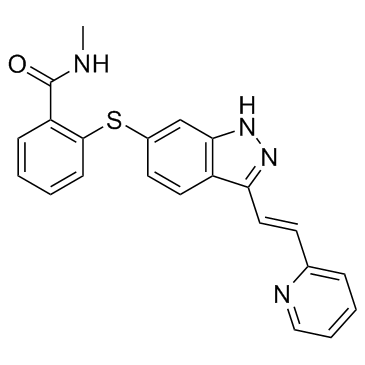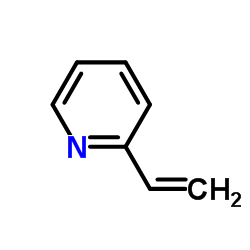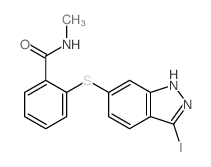319460-85-0
| Name | axitinib |
|---|---|
| Synonyms |
N-Methyl-2-({3-[(E)-2-(2-pyridinyl)vinyl]-1H-indazol-6-yl}sulfanyl)benzamide
UNII-C9LVQ0YUXG Inlyta 10mg Axitinib (usan) N-Methyl-2-({3-[(E)-2-(pyridin-2-yl)vinyl]-1H-indazol-6-yl}sulfanyl)benzamide AG-013736 N-Methyl-2-((3-((1E)-2-(pyridin-2-yl)ethenyl)-1H-indazol-6-yl)sulfanyl)benzamide Axtinib AVERMECTINB Axitinib N-methyl-2-({3-[(E)-2-(pyridin-2-yl)ethenyl]-1H-indazol-6-yl}sulfanyl)benzamide [14C]-Axitinib |
| Description | Axitinib is a multi-targeted tyrosine kinase inhibitor with IC50s of 0.1, 0.2, 0.1-0.3, 1.6 nM for VEGFR1, VEGFR2, VEGFR3 and PDGFRβ, respectively. |
|---|---|
| Related Catalog | |
| Target |
VEGFR1:0.1 nM (IC50) VEGFR2:0.2 nM (IC50) VEGFR3:0.1 nM (IC50) PDGFRβ:1.6 nM (IC50) |
| In Vitro | Axitinib (AG-013736) is a potent and selective inhibitor of VEGFR 1 to 3. In transfected or endogenous RTK-expressing cells, Axitinib potently blocks growth factor-stimulated phosphorylation of VEGFR-2 and VEGFR-3 with average IC50 values of 0.2 and 0.1 to 0.3 nM, respectively. Cellular activity against VEGFR-1 is 1.2 nM (measured in the presence of 2.3% bovine serum albumin), equivalent to an absolute IC50 of ~0.1 nM, based on protein binding of Axitinib. The potency against murine VEGFR-2 (Flk-1) in Flk-1-transfected NIH-3T3 cells is 0.18 nM, similar to that of its human homologue. Axitinib shows ~8- to 25-fold higher IC50 against the closely related type III and V family RTKs, including PDGFR-β (1.6 nM), KIT (1.7 nM), and PDGFR-α (5 nM); nanomolar concentrations of Axitinib blocks PDGF BB-mediated human glioma U87MG cell (PDGFR-β-positive) migration but not proliferation[2]. |
| In Vivo | A single oral dose of Axitinib (100 mg/kg) markedly suppresses murine VEGFR-2 phosphorylation for up to 7 h compared with control tumors. Axitinib rapidly inhibits VEGF-induced vascular permeability in the skin of mice; the inhibition is dose-dependent and directly correlated with drug concentration in mice. Pharmacokinetic/pharmacodynamic analysis indicate an unbound EC50 of 0.46 nM. Similar inhibitory effects are also shown in the skin of MV522 tumor-bearing mice without exogenous VEGF-A stimulation. Axitinib inhibits the growth of human xenograft tumors in mice. Axitinib produces dose-dependent growth delay regardless of initial tumor size, model type, or implant site[2]. |
| Cell Assay | Endothelial or tumor cells are starved for 18 h in the presence of either 1% FBS (HUVEC) or 0.1% FBS (tumor cells). Axitinib is added and cells are incubated for 45 min at 37°C in the presence of 1 mM Na3VO4. The appropriate growth factor is added to the cells, and after 5 min, cells are rinsed with cold PBS and lysed in the lysis buffer and a protease inhibitor cocktail. The lysates are incubated with immunoprecipitation antibodies for the intended proteins overnight at 4°C. Antibody complexes are conjugated to protein A beads and supernatants are separated by SDS-PAGE[2]. |
| Animal Admin | Mice and Rats[2] Mice with M24met xenograft tumors (400-600 mm3) are administered with a single dose of Axitinib or the control (0.5% carboxymethylcellulose/H2O). Blood and tumor tissue samples are collected for pharmacokinetic and VEGFR-2 measurements. Total protein concentrations in tumor tissues are determined using the Bradford colorimetric assay. Six-day-old Sprague-Dawley rats are given two i.p. injections of Axitinib (30 mg/kg ). Animals are sacrificed, retinas are collected and lysed, and immunoprecipitation/immunoblotting experiments are done. ECL-Plus is used for detection and densitometry analysis is done using the Alpha Imager 8800. |
| References |
| Density | 1.4±0.1 g/cm3 |
|---|---|
| Boiling Point | 668.9±55.0 °C at 760 mmHg |
| Melting Point | 213-215ºC |
| Molecular Formula | C22H18N4OS |
| Molecular Weight | 386.470 |
| Flash Point | 358.3±31.5 °C |
| Exact Mass | 386.120117 |
| PSA | 95.97000 |
| LogP | 4.15 |
| Vapour Pressure | 0.0±2.0 mmHg at 25°C |
| Index of Refraction | 1.728 |
| Storage condition | -20°C Freezer |
| Symbol |


GHS07, GHS09 |
|---|---|
| Signal Word | Warning |
| Hazard Statements | H302-H400 |
| Precautionary Statements | P273 |
| Hazard Codes | Xn,N |
| Risk Phrases | 22-50/53 |
| Safety Phrases | 60-61 |
| RIDADR | UN 3077 9 / PGIII |
| HS Code | 2933990090 |
| Precursor 2 | |
|---|---|
| DownStream 0 | |
| HS Code | 2933990090 |
|---|---|
| Summary | 2933990090. heterocyclic compounds with nitrogen hetero-atom(s) only. VAT:17.0%. Tax rebate rate:13.0%. . MFN tariff:6.5%. General tariff:20.0% |


